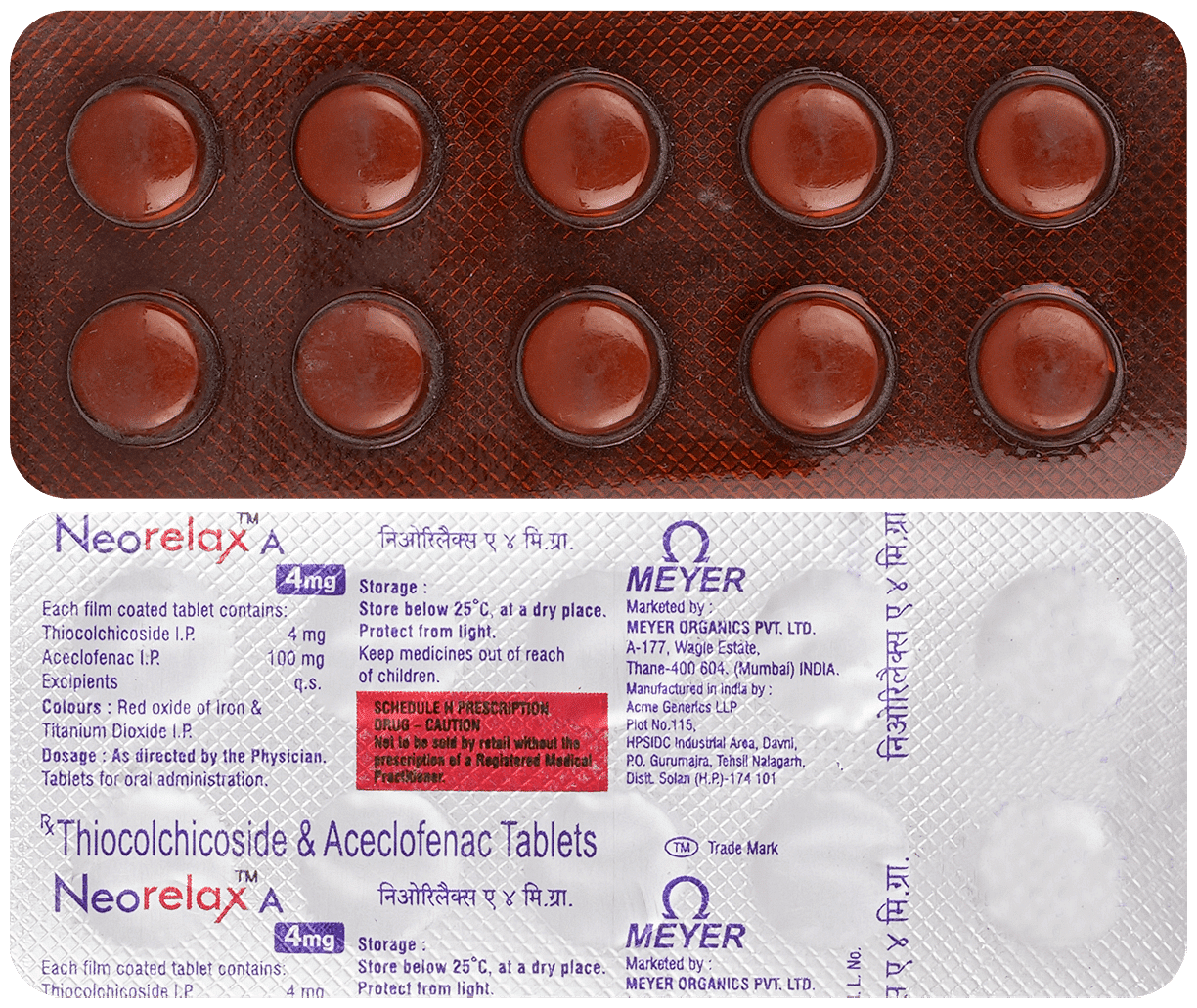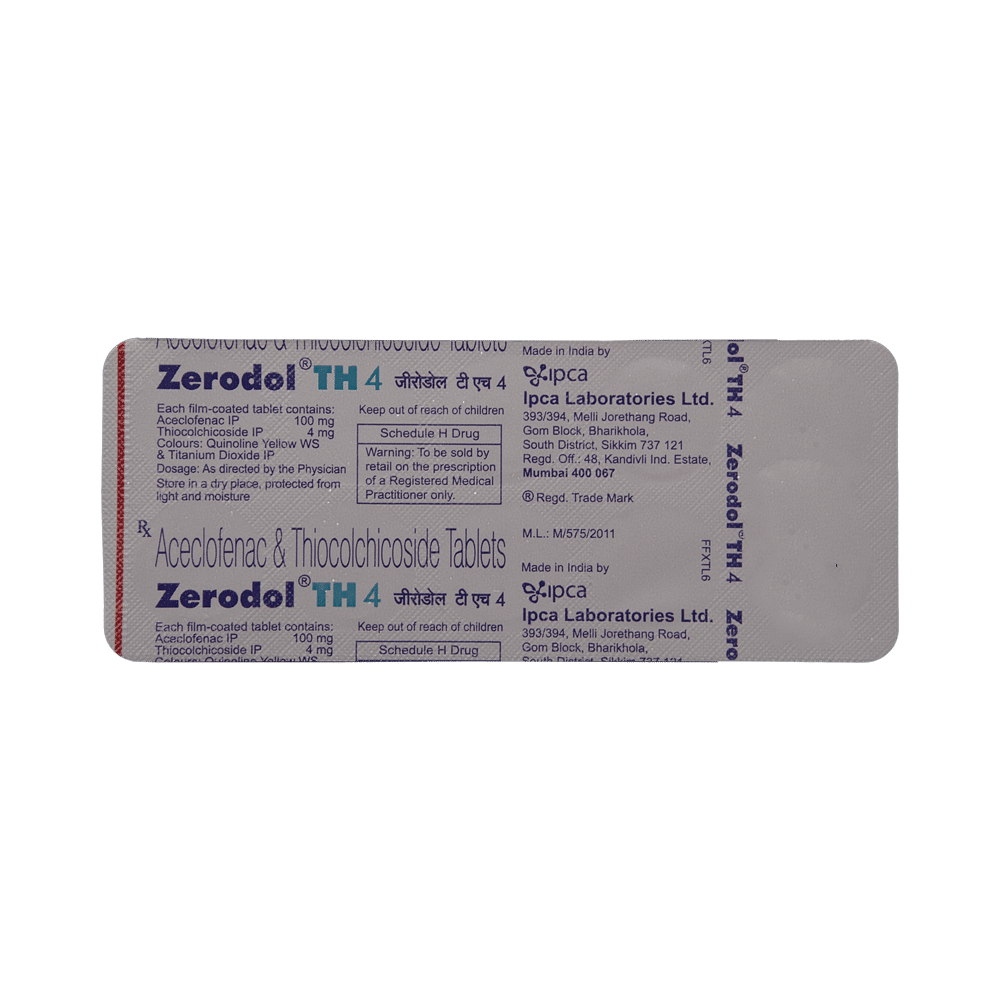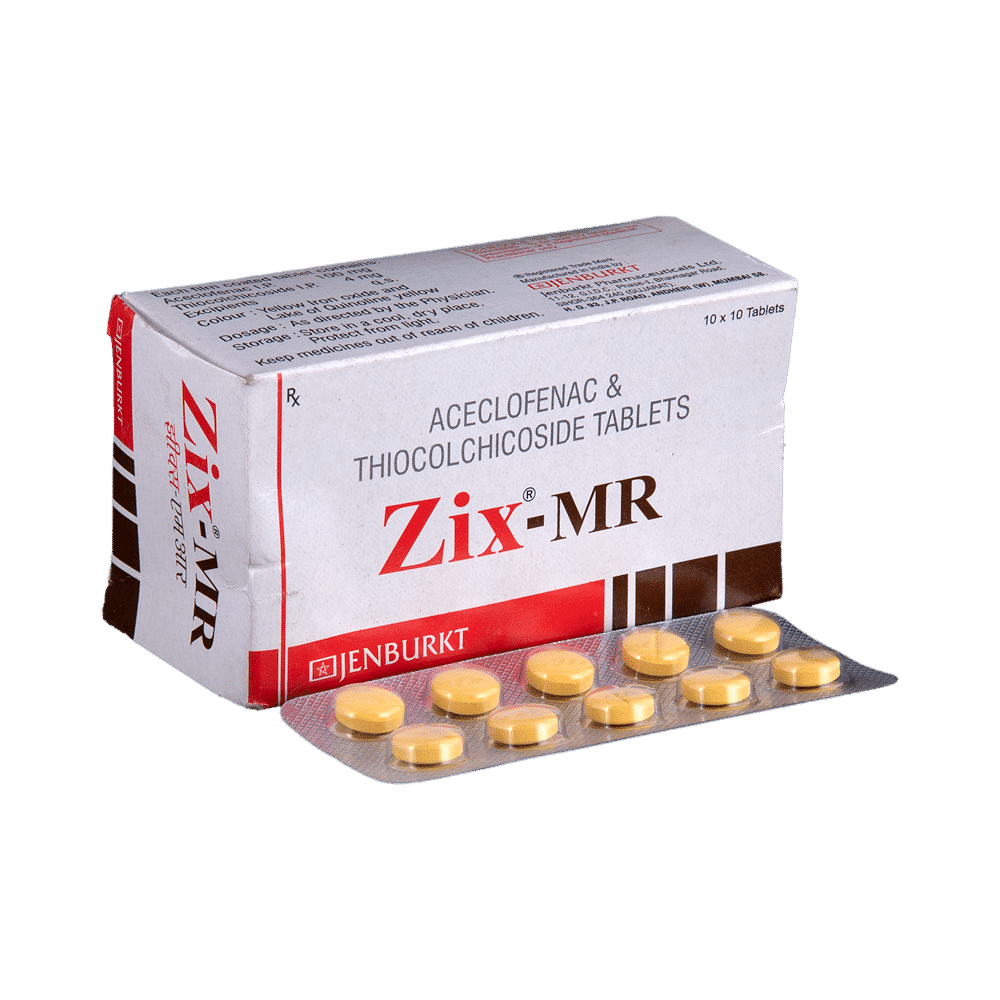
Acetryp TH 100mg/4mg Tablet
Manufacturer
Salud Care India Pvt Ltd
Salt Composition
Aceclofenac (100mg) + Thiocolchicoside (4mg)
Key Information
Short Description
Acetryp TH 100mg/4mg Tablet is a combination medicine used to treat pain due to muscle spasms, improving muscle movement and providing relief from pain and discomfort.
Dosage Form
Tablet
Introduction
Acetryp TH 100mg/4mg Tablet should be taken with food to prevent stomach upset. It should be taken regularly as advised by your doctor and not taken for a longer duration than recommended. Common side effects include nausea, vomiting, heartburn, stomach pain, loss of appetite, and diarrhea. If any of these side effects persist, consult your doctor. The medicine may not be suitable for everyone, so inform your doctor of any heart, kidney, or liver problems, as well as other medications you are taking. Pregnant and breastfeeding mothers should consult their doctors before using the medicine.
Directions for Use
Take this medicine in the dose and duration as advised by your doctor. Swallow it as a whole. Do not chew, crush, or break it. Take it with food.
Safety Information
Side Effects
No common side effects listed
Alcohol Warning
It is unsafe to consume alcohol with Acetryp TH 100mg/4mg Tablet.
Breastfeeding Warning
Information regarding the use of Acetryp TH 100mg/4mg Tablet during breastfeeding is not available. Please consult your doctor.
Pregnancy Warning
Acetryp TH 100mg/4mg Tablet may be unsafe to use during pregnancy. Although there are limited studies in humans, animal studies have shown harmful effects on the developing baby. Your doctor will weigh the benefits and any potential risks before prescribing it to you. Please consult your doctor.
How it works
Acetryp TH 100mg/4mg Tablet is a combination of two medicines: Aceclofenac and Thiocolchicoside, which relieves pain and relaxes the muscles.
Quick Tips
Take it with food to avoid an upset stomach It may cause dizziness. Do not drive or do anything requiring concentration until you know how it affects you Avoid consuming alcohol when taking Acetryp TH 100mg/4mg Tablet as it may cause excessive drowsiness
Related Medicines

Neorelax A 4mg Tablet

Zerodol TH 4 Tablet

Zix-MR Tablet

Consace TH 100mg/4mg Tablet

Thicoren AC 100mg/4mg Tablet

Allitose-T Tablet

Nacsol TH 100mg/4mg Tablet

Mathidol T 100mg/4mg Tablet

Thiozac A 100mg/4mg Tablet

Fenanix-T4 Tablet
Frequently asked questions
What is Acetryp TH 100mg/4mg Tablet?
Acetryp TH 100mg/4mg Tablet is a combination medication containing Aceclofenac and Thiocolchicoside. It is used to relieve muscle pain by relaxing muscles through its action on the central nervous system, reducing chemical substances in the body that contribute to pain and inflammation.
Is Acetryp TH 100mg/4mg Tablet safe to use?
Yes, Acetryp TH 100mg/4mg Tablet is generally safe for most patients. However, it can cause some common side effects such as nausea, vomiting, stomach pain, heartburn, and diarrhea. If these persist or worsen, notify your doctor immediately.
Can I stop taking Acetryp TH 100mg/4mg Tablet once my pain is relieved?
Acetryp TH 100mg/4mg Tablet is usually used for short-term relief and can be stopped when your pain subsides. However, your doctor may recommend continuing the medication as prescribed.
Can Acetryp TH 100mg/4mg Tablet cause dizziness?
Yes, some patients may experience dizziness (lightheadedness, weakness, or feeling faint) while taking this medication. If you experience these symptoms, it's advisable to rest for a short period and resume once you feel better.
Are there any contraindications with Acetryp TH 100mg/4mg Tablet?
Patients with known allergy to painkillers or any components of this medication should avoid using it. Additionally, the use of Acetryp TH 100mg/4mg Tablet is not recommended in patients with a history of stomach ulcer or active bleeding from the stomach. It's also crucial to avoid its use in individuals with pre-existing heart failure, high blood pressure, and liver or kidney disease.
Can I take Acetryp TH 100mg/4mg Tablet along with Vitamin B-complex?
Yes, Acetryp TH 100mg/4mg Tablet can be taken with Vitamin B-complex preparations as they complement each other. While the medication relieves pain, Vitamin B-complex helps correct any vitamin deficiency that might have contributed to your symptoms.
Can Acetryp TH 100mg/4mg Tablet cause kidney damage?
Prolonged use of Acetryp TH 100mg/4mg Tablet can potentially lead to kidney problems. The body naturally produces prostaglandins which protect the kidneys from potential damage. However, taking painkillers reduces these protective prostaglandins, increasing the risk of kidney damage over time. It is important to note that using painkillers isn't recommended for individuals with pre-existing kidney disease.
Will Acetryp TH 100mg/4mg Tablet be more effective if I take higher doses?
No, taking higher doses of this medication will not improve its effectiveness. Instead, it could potentially increase the likelihood and severity of side effects. If your symptoms are worsening, consult your doctor for a re-evaluation.


